
Speaking at a meeting of the Knesset Foreign Affairs and Defense Committee on Tuesday, Israeli Prime Minister Benjamin Netanyahu said that Israel "will not be bound" by any nuclear deal the US may potentially reach with Iran.
Iran has replaced Arab nations as the leading threat to Israel, and is now trying to "wipe out" the Arabs, the prime minister said, according to The Times of Israel.

"More than 90 percent of our security issues stem from Iran and her [proxies]. Our position is clear: Israel will not be bound by any deal with Iran and will continue to defend itself," Netanyahu added.
The prime minister’s comments come as recent reports have suggested that Tehran and Washington are working to reach an 'interim deal' regarding the Iranian nuclear program, which would see Iran be granted some sanctions relief in exchange for it limiting its uranium enriching activities.
Both Iran and the US have officially denied that an interim agreement is on the table. However, Washington held indirect 'proximity' nuclear talks with Iran in Oman, anonymous sources told Axios recently, with Omani officials going between the two sides and passing messages.
According to the sources, the aim of the talks was to deescalate tensions as a basis for future talks on a new nuclear agreement between the parties.
Just two days ago, Iran’s Supreme Leader Ali Khamenei said that a nuclear deal with the west is welcomed as long as the Islamic Republic’s nuclear infrastructure remains untouched.
"You may want to reach agreements in some fields. Nothing is wrong with [reaching] agreements, but the infrastructure must remain intact. It must not be harmed. These are the fruit of others’ endeavors," Khamenei said following a visit to an exhibition showcasing Iran’s progress in various nuclear-related sectors. However, the Iranian leader added that government officials must "understand" where to place their trust.
In August 2022, Tehran and Washington got closer to reaching a deal than ever before after talks resumed following an EU-drafted proposal to revive the 2015 nuclear deal under the Joint Comprehensive Plan of Action (JCPOA), which former US president Donald Trump withdrew from in 2018.
Not long after, efforts stalled once again as the result of a coordinated Israeli pressure campaign aimed at preventing Washington from going through with an agreement. The revival of the deal ultimately failed, as western-sponsored civil unrest began to unfold on the streets of the Islamic Republic.
The International Atomic Energy Agency (IAEA) recently closed a number of cases against Iran, ruling that traces of near-weapons grade uranium found in the country were only residual and not intended for use in making a nuclear bomb. Nonetheless, Israel has continued to threaten war against the Islamic Republic under the pretext of defending itself and ensuring peace.
Meanwhile, Israel has continued to 'neither confirm nor deny' the presence of its own nuclear arsenal. "We are working to stop Iran, and, on the other hand, we are making great efforts to expand the circle of peace. These things present us with great challenges, but also possibilities," Netanyahu said during the meeting.
Speaking at a meeting of the Knesset Foreign Affairs and Defense Committee on Tuesday, Israeli Prime Minister Benjamin Netanyahu said that Israel “will not be bound” by any nuclear deal the US may potentially reach with Iran.
Iran has replaced Arab nations as the leading threat to Israel, and is now trying to “wipe out” the Arabs, the prime minister said, according to The Times of Israel.

“More than 90 percent of our security issues stem from Iran and her [proxies]. Our position is clear: Israel will not be bound by any deal with Iran and will continue to defend itself,” Netanyahu added.
The prime minister’s comments come as recent reports have suggested that Tehran and Washington are working to reach an ‘interim deal’ regarding the Iranian nuclear program, which would see Iran be granted some sanctions relief in exchange for it limiting its uranium enriching activities.
Both Iran and the US have officially denied that an interim agreement is on the table. However, Washington held indirect ‘proximity’ nuclear talks with Iran in Oman, anonymous sources told Axios recently, with Omani officials going between the two sides and passing messages.
According to the sources, the aim of the talks was to deescalate tensions as a basis for future talks on a new nuclear agreement between the parties.
Just two days ago, Iran’s Supreme Leader Ali Khamenei said that a nuclear deal with the west is welcomed as long as the Islamic Republic’s nuclear infrastructure remains untouched.
“You may want to reach agreements in some fields. Nothing is wrong with [reaching] agreements, but the infrastructure must remain intact. It must not be harmed. These are the fruit of others’ endeavors,” Khamenei said following a visit to an exhibition showcasing Iran’s progress in various nuclear-related sectors. However, the Iranian leader added that government officials must “understand” where to place their trust.
In August 2022, Tehran and Washington got closer to reaching a deal than ever before after talks resumed following an EU-drafted proposal to revive the 2015 nuclear deal under the Joint Comprehensive Plan of Action (JCPOA), which former US president Donald Trump withdrew from in 2018.
Not long after, efforts stalled once again as the result of a coordinated Israeli pressure campaign aimed at preventing Washington from going through with an agreement. The revival of the deal ultimately failed, as western-sponsored civil unrest began to unfold on the streets of the Islamic Republic.
The International Atomic Energy Agency (IAEA) recently closed a number of cases against Iran, ruling that traces of near-weapons grade uranium found in the country were only residual and not intended for use in making a nuclear bomb. Nonetheless, Israel has continued to threaten war against the Islamic Republic under the pretext of defending itself and ensuring peace.
Meanwhile, Israel has continued to ‘neither confirm nor deny’ the presence of its own nuclear arsenal. “We are working to stop Iran, and, on the other hand, we are making great efforts to expand the circle of peace. These things present us with great challenges, but also possibilities,” Netanyahu said during the meeting.
Loading…





